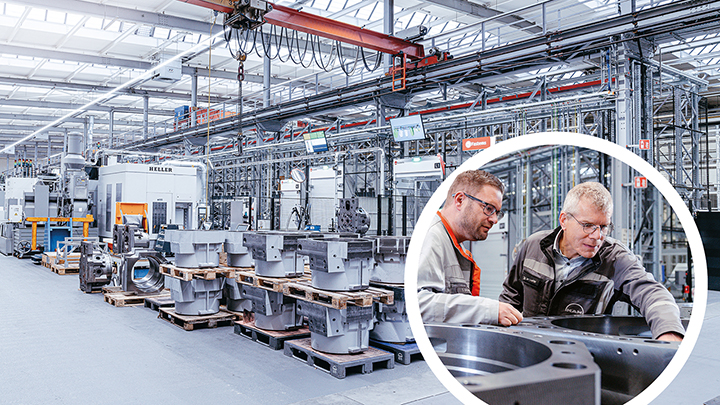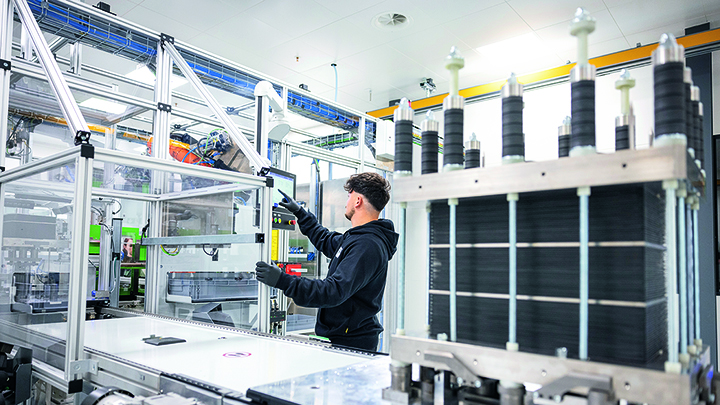In this interview, Petra Rektorik explains the development challenges that have to be overcome for four-stroke engines to be able to burn the future fuel methanol.
MAN People: Petra Rektorik, our strategy for the future states that we want to offer ‘green engines’ that run on climate-friendly fuels. Why is methanol leading the pack as a fuel alternative in the four-stroke segment as well?
Petra Rektorik: Methanol’s biggest advantage – which is also shared by other alternatives like ammonia and hydrogen – is that it offers soot-free combustion. In addition, nitrogen oxide emissions are lower than with diesel: The vaporization of methanol requires a lot of heat energy, lowering combustion chamber temperatures. This in turn reduces production of nitrogen oxide. No CO2 is emitted when carbon-neutral, i. e. synthetically produced, methanol is used. And the benefits do not stop there: methanol is liquid, making it easier to store, it has a higher energy density than ammonia – so the desired engine output is achieved with less fuel – and finally methanol is very common in the chemical industry and already available at many ports. We are developing engines for methanol, ammonia and hydrogen. As matters stand, methanol will be the first fuel to be used in the marine segment.
As matters stand, methanol will be the first fuel to be used in the marine segment.
What is the challenge of using methanol as fuel?
There are two ways of burning methanol in the engine: The first concept is based on a premixed Otto process like that used in our gas dual-fuel engines. The power density that can be achieved with this option is lower, but the system is less complex and can be made ready for the market faster. That is why we are pursuing it for our retrofit solutions in particular. The second concept is based on a diffusive diesel process like that used in our two-stroke methanol engines. It offers higher power density and we are developing this solution for our newbuild engines. The methanol injection system required by the second concept is our biggest development challenge. The injection system is significantly affected by methanol’s properties, including its poor lubricity. One of methanol’s most important characteristics is energy density, which is only about half that of diesel. In other words, I have to introduce twice as much fuel, but only have the same amount of time as with diesel to inject this volume. Then the fuel has to ignite. Whereas diesel is self-igniting, methanol requires diesel pilot injection to ignite, which makes the mixture formation of air and methanol crucial for efficient ignition and combustion. Methanol also has a strong cooling effect, which presents a challenge when it comes to diesel ignition. In short, all these parameters – amount of fuel, injection interval and timing, mixture formation, timing and pilot injection dosage – have to fit together for the engine to run stably.
When will the first MAN four-stroke engine run on methanol? And, in your view, how long will it be before there is a complete switch to climate-friendly fuels?
Extensive single-cylinder trials have been under way since 2019. The first complete engine is scheduled to start in the 48/60 retrofit project in 2024. There are a lot of factors influencing a complete switch to climate-friendly fuels. Such as how much self-initiative shipping companies have when it comes to contributing to climate protection. And then there are future rules, such as those issued by the International Maritime Organization (IMO), not to mention fuel prices. All these factors will affect how quickly methanol and other future fuels take over.
Petra Rektorik
studied mechanical engineering at the Technical University of Munich and first came into contact with MAN through a lecture there. An internship was followed by a master’s degree and then a doctorate with a thesis on injection system development. Specializing in high-pressure methanol injection and the associated combustion process, she has been permanently employed in the four-stroke combustion process development team since June 2023.
Explore more topics
Creating a cleaner fuel
Renewable synthetic fuels like synthetic natural gas and methanol are pivotal in decarbonizing the economy, with potential applications in industrial processes, chemical manufacturing, shipping and much, much more. Discover takes a peek inside the processes and technologies that are helping to bring these fuels to the world.
The benefits of methanol
With Maersk’s order of the world’s first container vessel fueled by carbon-neutral methanol, the fuel’s use is likely to gain momentum as maritime shipping transitions to become a greener industry. But what are its real advantages? MAN Energy Solutions’ fuel and two-stroke expert Kjeld Aabo tells us why methanol is so attractive.
-

Zurich compressor technology minimizes footprint
MAN ES is supplying two electric HOFIM® compressor systems for gas storage facilities in Italy – Zurich’s state-of-the-art compressor technology will help to reduce emissions.
-

An important investment in the Augsburg site
A state-of-the-art system for processing cylinder heads is currently being put into operation in Augsburg – a further contribution to securing the site’s future.
-

Milestone for green hydrogen economy
Quest One – formerly H-TEC SYSTEMS – is going to manufacture PEM electrolysis stacks in Hamburg using highly automated series production. These will play a key role in ramping up the hydrogen economy.
